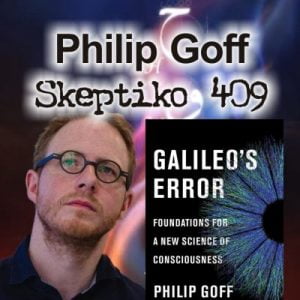Revisiting Materialism in Science: A Deep Dive with Dr. Philip Goff on Skeptiko
 In an enlightening episode of Skeptiko hosted by Alex Tsakiris, Dr. Philip Goff challenges the entrenched materialistic worldview in academia and science. This conversation, titled “Dr. Philip Goff, Will Academia Get Beyond Materialism? |409|”, delves into the complex and often debated realm of consciousness and its place in scientific study. Here, we expand on their discussion, shedding light on the key disagreements and debates that emerged.
In an enlightening episode of Skeptiko hosted by Alex Tsakiris, Dr. Philip Goff challenges the entrenched materialistic worldview in academia and science. This conversation, titled “Dr. Philip Goff, Will Academia Get Beyond Materialism? |409|”, delves into the complex and often debated realm of consciousness and its place in scientific study. Here, we expand on their discussion, shedding light on the key disagreements and debates that emerged.
1. Confronting the Dominance of Materialism
The dialogue begins with a critical examination of how materialism has shaped scientific perspectives and academic norms. Dr. Goff points out the limitations of a worldview that prioritizes tangible, measurable phenomena, arguing that this approach falls short in explaining the complexities of consciousness. This sets the stage for a broader discourse on the need to rethink and expand the boundaries of what is considered ‘real’ in scientific terms.
2. Questioning Established Academics and Their Materialistic Approaches
Dr. Goff expresses strong reservations about the competence of prominent academics, like Jerry Coyne, in grappling with concepts like consciousness and value. This part of the conversation underscores a significant schism in academic thought, with Goff advocating for a more nuanced and inclusive understanding that goes beyond rigid materialism.
3. Science’s Role in Understanding Consciousness
One of the pivotal debates in the episode revolves around the role of science in comprehending consciousness. The discussion pushes against the idea that only observable and measurable entities constitute reality. Instead, it posits consciousness as an integral part of the universe, urging a paradigm shift in scientific inquiry.
4. The Dilemma of Materialism and Dualism in Explaining Consciousness
The conversation traverses the traditional divide between materialism and dualism in understanding consciousness. Goff shares his disillusionment with both frameworks, advocating for a more abstract and holistic approach that accounts for the complexities and nuances of consciousness beyond the physical.
5. Galileo’s Impact on the Consciousness Conundrum
In discussing his book, “Galileo’s Error,” Dr. Goff attributes current challenges in understanding consciousness to Galileo’s design of physical science. He argues that Galileo’s exclusion of consciousness from scientific consideration has led to a fragmented understanding of reality, necessitating a more comprehensive approach.
6. Neuroscience’s Materialistic Lens and Its Limitations
The episode touches upon neuroscience’s materialistic approach to studying consciousness. Goff argues that this perspective is inherently limited, as it fails to capture the qualitative essence of conscious experiences, thus calling for a broader, more inclusive scientific methodology.
7. Social Engineering and Academic Bias in Consciousness Studies
Dr. Goff and Alex Tsakiris also delve into the role of social engineering in shaping academic discourse and research, particularly in the realm of consciousness studies. They discuss how academic biases and funding priorities can influence which theories are promoted or sidelined, highlighting a need for greater openness and diversity in scholarly pursuits.
Also read: Dr. Philip Goff Biography
To further enrich our understanding, let’s revisit a segment from this compelling episode of Skeptiko. The following video encapsulates key aspects of the conversation:
As we reflect on this profound discussion between Dr. Philip Goff and Alex Tsakiris, it becomes evident that the journey to understanding consciousness is as intricate as it is essential. Moving beyond materialism not only opens new frontiers in science but also deepens our grasp of the human experience.





